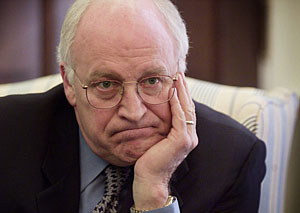
Stephen J. Glain and Robert Schlesinger, 10 July 2003, Boston Globe
KBR's work in Iraq [Kellogg, Brown & Root Services, a subsidiary of oil-services giant Halliburton Co.] comes under two different contracts. In 2001 the company was awarded a 10-year contract under the Army Logistics Civil Augmentation Program, known as Logcap, that calls for the company to provide a wide range of logistical services to the US Army. By the end of May, KBR had received $425 million under that contract, according to correspondence between Representative Henry A. Waxman of California, the ranking Democrat on the House Government Reform Committee, and the Department of the Army. Through that contract, KBR had prepositioned personnel and equipment in the Iraq region - deployments that in the Army's eyes made the company the logical choice for an oil infrastructure contract that was awarded soon after the war in Iraq began.
That KBR contract - according to Waxman, who is investigating the deal - has "no set time limit and no dollar limit and is apparently structured in such a way as to encourage the contract to increase its costs and, consequently, the costs to the taxpayer." It took Waxman's investigation to uncover key details of the KBR contract, which was awarded by the Army Corps of Engineers as part of a secret process by US government agencies charged with rebuilding postwar Iraq. Several of the companies involved in the closed-door bidding, allowed in times of a national crisis under federal procurement laws, have close ties to the White House or were major contributors to the Bush presidential campaign. In addition to KBR, the winning bidders included San Francisco-based Bechtel/Parsons Brinckerhoff, which was awarded a $780 million contract to supervise Iraqi reconstruction. Bechtel, together with Halliburton, donated more than $2 million in campaign contributions, primarily to Republican candidates, according to the Center for Responsive Politics. From 1995 to 2000, Halliburton was headed by now-Vice President Dick Cheney.
KBR, according to an Army Corp of Engineers official responding in early April to Waxman's written queries, was awarded a two-year, $7 billion contract to put out oil well fires and evaluate the state of petroleum fields in postwar Iraq. By early July, five "task orders" had been issued under the infrastructure contract worth more than $282 million, according to a website set up by the Army Corps of Engineers. The orders included training and advice for safely shutting down equipment and assessing damage, repairing facilities, building base camp facilities, and bringing oil into Iraq while indigenous distribution systems are still being repaired. The contract was designed to cover a "worst-case estimate" of possible damage, wrote Lieutenant General Robert Flowers, and "those services necessary to support the mission in the near term." Flowers gave Waxman his written assurance that "no other contractor could satisfy the mission requirements."
That's not how many Iraqis see it.
full article






No comments:
Post a Comment